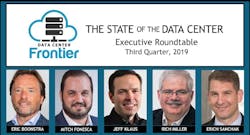Executive Roundtable: The Global Data Center Landscape
Welcome to our 16th Data Center Executive Roundtable, a quarterly feature showcasing the insights of thought leaders on the state of the data center industry, and where it is headed. In our Third Quarter 2019 roundtable, we examine four topics: opportunities in international markets, key trends in interconnection services, helping the supply chain keep pace with hyperscale timelines, and the future of automation in data center management.
Here’s a look at our distinguished panel:
- Jeff Klaus is General Manager of Intel Data Center Software Solutions, leading a global team that designs, builds, sells and supports Intel DCM software.
- Erich Sanchack is Executive Vice President of Operations at Digital Realty, responsible for overseeing global portfolio operations, global construction, colocation and interconnection service as well as supply chain operations.
- Mitch Fonseca is the VP, Data Center Products at Cyxtera Technologies, leading the global datacenter product management and commercial services teams.
- Eric Boonstra is Vice President & General Manager of the Data Center business for Iron Mountain, joining the company in 2018 through its acquisition of EvoSwitch.
The conversation is moderated by Rich Miller, the founder and editor of Data Center Frontier. Each day this week we will present a Q&A with these executives on one of our key topics. We begin with a look at our panelists’ take on the global data center landscape.
Data Center Frontier: This year we have seen strong demand for data center space in international markets. What are the biggest opportunities and challenges for data center companies in operating at global scale and working with multi-national clients?
ERIC BOONSTRA, Iron Mountain
Eric Boonstra: We’ve seen huge growth in the FLAP (Frankfurt, London, Amsterdam and Paris) regions in Europe. These are traditionally the four biggest data center/digital economy regions in Europe. And they are still growing fast.
Demand is growing, but the composition of that demand is changing. Hyperscalers were responsible for about 70 percent of the colocation space last year in FLAP. That demonstrates the rapid growth of the cloud, and means that data center/colocation providers will have more and more hyperscalers and cloud providers in our facilities.
These days, data center providers accommodate a blend of retail, wholesale and hyperscale customers in their facilities, and each of these three customer groups have different needs and requirements. While we used to have specific wholesale and retail data centers, now we need to offer a blend if we want to attract all three customer groups.
Colocation providers must make a choice – do we want to stay a retail or wholesale provider, or do we want to serve everyone? Many of us, including Iron Mountain, want to serve everyone so we must change things. We need to be more flexible in how we build our data centers, as well as how we set up our contracts and SLA’s, how we finance, etc.
We’re also seeing an increasing demand from our customers to work with them on an international level. They have a need in Amsterdam, Frankfurt, Virginia and Singapore, for example. The providers that show flexibility, and that have an international footprint and capacity at the right time and the right place are the ones who will be leading the global data center market.
Jeff Klaus, General Manager of Intel Data Center Management Solutions
Jeff Klaus: Globally we are still seeing increasing data center growth. As noted in a recent report, “the seven primary U.S. data center markets saw 171 megawatts (MW) of net absorption in H1 2019, nearly 57 percent of 2018’s full-year record. That absorption nearly eclipsed the 200 MW of capacity added in H1. Northern Virginia, the largest data center market in the world, accounted for 74 percent of net absorption in the primary markets.”
That interest has several drivers that I believe carry forward regardless of the potential geopolitical issues. Those drivers include, corporate multi-cloud usage, 5G adoption, AI, and blockchain utilization (outside of cryptocurrency). Challenges will continue to be competitive pressure from demand to meet the megawatt absorption we continue to see.
I think providers will have to innovate in their software solution stack and partnerships to maintain a differentiation and capture more demand.
ERICH SANCHACK, Digital Realty
Erich Sanchack: As more colocation data center companies look at scaling globally, the ability to access data center resources in a way that is consistent to the customer will become increasingly important. From the customer perspective, large multi-national companies are starting to look at the advantages of working with one colocation provider across several regions.
As organizations look to scale, they need a provider that can grow with them to allow them to reach their full potential and keep up with the evolution of their business models. Providers that offer a range of solutions across edge, hyperscale and interconnection capabilities will win.
There are challenges when implementing a global model. For example, we see a trend in security and privacy issues becoming more specific to a region, making data and network compliance more complex. Take a regulation like GDPR: It is increasingly difficult to guarantee that certain data is only stored and used in particular geographies when that level of specificity and location goes against the core benefit of interconnectivity.
Additionally, when certain tools and data sets are legally constrained to a particular country or region, promoting global interconnection can pose a challenge. Data center providers must now look at security holistically to ensure we meet both global and local mandates and can act as a consultant to our multi-national clients. We are now tasked with ensuring we can protect their assets and data effectively, without risking the gains clients want to achieve from a globally connected network.
Mitch Fonseca, VP, Data Center Products, Cyxtera
Mitch Fonseca: Data sovereignty concerns in international markets create new opportunities for data center companies. At Cyxtera, we’re seeing increased demand for capacity in places such as the UK, Frankfurt, Amsterdam and Singapore as enterprises seek data locality in compliance with local privacy laws. To serve our multi-national customers in these markets most expeditiously, we’re expanding our footprint with existing facilities while planning new builds in strategic locations.
Data center providers face two key challenges operating on a global scale to support multi-national clients: customer service and flexibility. Enterprises expect a consistent service experience regardless of data center location. For example, Cyxtera provides customers a single contract vehicle across our global footprint as well as a self-service portal for administration, billing and support across their entire environment.
Flexibility is also key as customers’ capacity and location needs are always changing. Our on-demand data center platform, CXD, gives multi-national customers the ability to point, click and provision interconnection and infrastructure in a consumption-based model. In addition, Cyxtera allows our customers to shift capacity to and from other markets or between products without penalty. This enables a customer to deploy traditional colocation today and port that over to a CXD deployment in a new market quickly and easily as their demand shifts or expands.
NEXT: A look at key trends in interconnection and the impact of software-defined networking.
Keep pace with the fact-moving world of data centers and cloud computing by following us on Twitter and Facebook, connecting with me on LinkedIn, and signing up for our weekly newspaper using the form below:
About the Author



